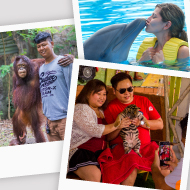Report highlights animal cruelty in zoos across the world

Wild animals in zoos and aquariums across the world are enduring appalling suffering for visitor entertainment.
Animal welfare organisation World Animal Protection (WAP) is calling on the World Association of Zoos and Aquariums (WAZA) to fulfil its role as the global alliance of ‘the world’s leading zoos and aquariums’.
The demand comes after a report by WAP revealed that wild animals in zoos and aquariums across the world are enduring appalling suffering for visitor entertainment.
Titled The Show Can’t Go On, the report documents animal suffering behind visitor attractions provided by zoos linked with WAZA. Among these include wildlife ‘selfies’, circus-like shows and elephant rides.
It also includes on-site research carried out at 12 WAZA-linked zoos and aquariums. During this, researchers observed big cats being forced to perform tricks set to loud music, dolphins being used as surfboards by their trainers, and primates being exploited as photo-props dressed in costume.
“Our research exposes some of the worst examples of wild animal attractions that simply have no place in a modern zoo,” the report notes. “Whilst acknowledging that a life in captivity will always be a far cry from a life in the wild, this report maps out solutions to establishing responsible zoos and aquariums that respect the animals in their care.”
WAZA is the “umbrella” organisations for zoos and aquariums across the world. As such, it is expected to maintain clear animal welfare standards and guidelines for its members.
The overall goal of WAZA is to ‘guide, promote and encourage members in animal care and welfare.’ But this report shows that cruel and demeaning visitor attractions are still taking place in venues such as Sea World, San Antonio, and the Cango Wildlife Each, South Africa.
WAP states that by failing to properly address these attractions, WAZA itself ‘is failing to adhere to its own animal welfare guidelines’.
“WAZA should clarify and communicate its position on this issue and review and revise membership status from any venues refusing to shift away from providing irresponsible wild animal visitor attractions,” the report concludes. “It needs to make its interventions public with clear, time-bound action plans which the zoos and aquariums can be held accountable.
“Tourists visiting any venue displaying the WAZA logo must be confident they are not inadvertently supporting cruel visitor interactions with wild animals.”



 The RCVS has announced a new version of its 1CPD mobile app, with enhanced features for veterinary surgeons and veterinary nurses to record their continuing professional development.
The RCVS has announced a new version of its 1CPD mobile app, with enhanced features for veterinary surgeons and veterinary nurses to record their continuing professional development.